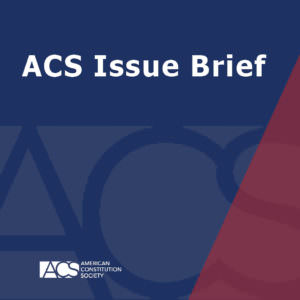National Security Without Secret Laws: How Other Nations Balance National Security Interests and Transparency of the Law
Associate Dean For Faculty Development & Intellectual Life and Professor of Law, Western New England University School of Law
July 21, 2009
 ACS is pleased to distribute an Issue Brief by Sudha Setty, Assistant Professor of Law at the Western New England College School of Law, entitled “National Security Without Secret Laws: How Other Nations Balance National Security Interests and Transparency of the Law.” In this Issue Brief, Professor Setty explores the issues surrounding, and the arguments against, secret law by providing an international comparative perspective. As an example of secret law, Professor Setty cites the lack of transparency surrounding the Bush Administration Department of Justice’s Office of Legal Counsel (OLC) March 2003 torture policy memorandum, which was kept secret for years before being declassified and disclosed in April 2008 in response to a Freedom of Information Act lawsuit. Professor Setty examines the justifications given for nondisclosure, such as arguments that disclosure is incompatible with prioritizing national security. In brief, Professor Setty rejects such a formulation, stating “[t]he claim that national security threats require secret law and an unprecedented lack of transparency is undermined by comparison with other nations.” To make this point, the Issue Brief describes how other nations that face severe national security threats—-such as India, Israel, and the United Kingdom—-maintain transparency and public accessibility for national security legal policy. Professor Setty observes that the Obama administration appears committed to greater transparency, yet the author concludes by urging “serious consideration of structural reform to ensure objectivity, transparency, and political accountability at OLC from administration to administration.”
ACS is pleased to distribute an Issue Brief by Sudha Setty, Assistant Professor of Law at the Western New England College School of Law, entitled “National Security Without Secret Laws: How Other Nations Balance National Security Interests and Transparency of the Law.” In this Issue Brief, Professor Setty explores the issues surrounding, and the arguments against, secret law by providing an international comparative perspective. As an example of secret law, Professor Setty cites the lack of transparency surrounding the Bush Administration Department of Justice’s Office of Legal Counsel (OLC) March 2003 torture policy memorandum, which was kept secret for years before being declassified and disclosed in April 2008 in response to a Freedom of Information Act lawsuit. Professor Setty examines the justifications given for nondisclosure, such as arguments that disclosure is incompatible with prioritizing national security. In brief, Professor Setty rejects such a formulation, stating “[t]he claim that national security threats require secret law and an unprecedented lack of transparency is undermined by comparison with other nations.” To make this point, the Issue Brief describes how other nations that face severe national security threats—-such as India, Israel, and the United Kingdom—-maintain transparency and public accessibility for national security legal policy. Professor Setty observes that the Obama administration appears committed to greater transparency, yet the author concludes by urging “serious consideration of structural reform to ensure objectivity, transparency, and political accountability at OLC from administration to administration.”
Read the full Issue Brief here: National Security Without Secret Laws: How Other Nations Balance National Security Interests and Transparency of the Law
